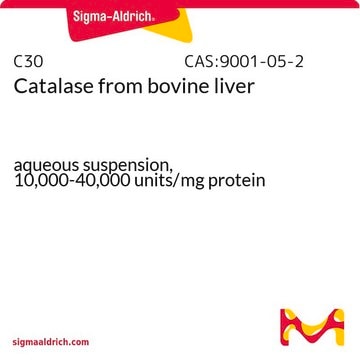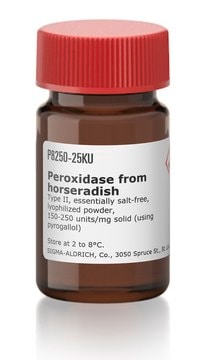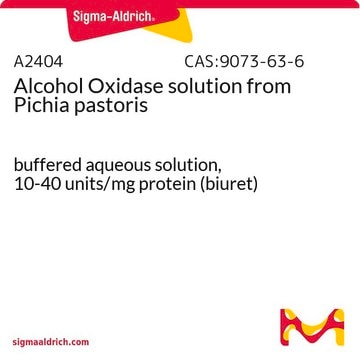Összes fotó(3)
Fontos dokumentumok
G7400
Galactose Oxidase from Dactylium dendroides
lyophilized powder, ≥3,000 units/g solid
Szinonimák:
D-Galactose:oxygen 6-oxidoreductase
Bejelentkezésa Szervezeti és Szerződéses árazás megtekintéséhez
Összes fotó(3)
About This Item
Javasolt termékek
biológiai forrás
fungus (Dactylium dendroides)
Minőségi szint
form
lyophilized powder
specifikus aktivitás
≥3,000 units/g solid
tárolási hőmérséklet
−20°C
Looking for similar products? Látogasson el ide Útmutató a termékösszehasonlításhoz
Általános leírás
Galactose oxidase is an extracellular copper-containing enzyme, secreted by the deuteromycete fungus Dactylium dendroides. It catalyzes the oxidation of a range of primary alcohols, including D-galactose, to the corresponding aldehyde, with reduction of oxygen to hydrogen peroxide.
Alkalmazás
Galactose oxidase may be used as an analytical tool for the specific determination of D-galactose in blood plasma, plant extracts, and phospholipids. It could be used for the characterization of terminal D-galactoside units in several polymers.
Biokémiai/fiziológiai hatások
Galactose oxidase catalyzes the coversion of D-galactose to D-galacto-hexodialdose.
2-Deoxy-D-galactose, lactose, melibiose, raffinose and stachyose react with galactose oxidase in the peroxidase:o-tolidine system.
Essentially no oxidation of D-glucose, L-galactose, L-arabinose or D-glucuronate has been observed.
2-Deoxy-D-galactose, lactose, melibiose, raffinose and stachyose react with galactose oxidase in the peroxidase:o-tolidine system.
Essentially no oxidation of D-glucose, L-galactose, L-arabinose or D-glucuronate has been observed.
Egység definíció
One unit will produce a ΔA425 of 1.0 per min at pH 6.0 at 25 °C, in a peroxidase and o-tolidine system. Reaction volume = 3.4 mL. Light path = 1 cm.
inhibitor
Product No.
Leírás
Árazás
kapcsolódó termék
Figyelmeztetés
Danger
Figyelmeztető mondatok
Óvintézkedésre vonatkozó mondatok
Veszélyességi osztályok
Resp. Sens. 1
Tárolási osztály kódja
11 - Combustible Solids
WGK
WGK 1
Lobbanási pont (F)
Not applicable
Lobbanási pont (C)
Not applicable
Analitikai tanúsítványok (COA)
Analitikai tanúsítványok (COA) keresése a termék sarzs-/tételszámának megadásával. A sarzs- és tételszámok a termék címkéjén találhatók, a „Lot” vagy „Batch” szavak után.
Már rendelkezik ezzel a termékkel?
Az Ön által nemrégiben megvásárolt termékekre vonatkozó dokumentumokat a Dokumentumtárban találja.
Az ügyfelek ezeket is megtekintették
Bei Yue et al.
Frontiers in pharmacology, 12, 774560-774560 (2021-11-20)
Irinotecan (CPT11), a broad-spectrum cytotoxic anticancer agent, induces a series of toxic side-effects. The most conspicuous side-effect is gastrointestinal mucositis, including nausea, vomiting, and diarrhea. A growing body of evidence indicates that bacteria β-glucuronidase (GUS), an enzyme expressed by intestinal
Yuling Sun et al.
Biomacromolecules, 22(6), 2595-2603 (2021-05-07)
Antifreeze glycoproteins (AFGPs) are able to bind to ice, halt its growth, and are the most potent inhibitors of ice recrystallization known. The structural basis for AFGP's unique properties remains largely elusive. Here we determined the antifreeze activities of AFGP
A R Shatzman et al.
Journal of bacteriology, 130(1), 455-463 (1977-04-01)
The effects of pH and growth density on the amount of an extracellular enzyme, galactose oxidase, synthesized by the fungus Dactylium dendroides were studied. Growth at a pH below 6.7 caused a decrease in the ability of the organism to
Grant E Henderson et al.
Bioconjugate chemistry, 22(5), 903-912 (2011-03-15)
The site-specific modification of proteins is expected to be an important capability for the synthesis of bioconjugates in the future. However, the traditional repertoire of reactions available for the direct modification of proteins suffers from lack of specificity, necessitating costly
Development of a galactose biosensor with galactose oxidase-immobilized epidermis of Solanum lycopersicum: potential point-of-care testing for citrin deficiency in high-prevalence areas.
Hencher H C Lee et al.
Clinica chimica acta; international journal of clinical chemistry, 412(3-4), 391-392 (2010-10-26)
Tudóscsoportunk valamennyi kutatási területen rendelkezik tapasztalattal, beleértve az élettudományt, az anyagtudományt, a kémiai szintézist, a kromatográfiát, az analitikát és még sok más területet.
Lépjen kapcsolatba a szaktanácsadással














